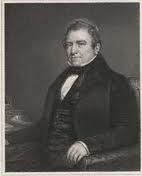Annotation:Joseph Hume: Difference between revisions
*>Move page script m (moved Talk:Joseph Hume to Annotation:Joseph Hume) |
m (Text replacement - "garamond, serif" to "sans-serif") |
||
| (One intermediate revision by the same user not shown) | |||
| Line 1: | Line 1: | ||
[[{{BASEPAGENAME}} | '''Back to [[{{BASEPAGENAME}}]]''' | ||
---- | ---- | ||
<p><font face=" | <p><font face="sans-serif" size="4"> | ||
'''JOSEPH HUME'''. Scottish, Strathspey. F Major. Standard tuning (fiddle). AABB'. Joseph Hume [http://en.wikipedia.org/wiki/Joseph_Hume] (1777-1855) was born in Montrose, Angus, Scotland. He studied medicine and joined the army, moving to India in 1797 where he acquired native languages and worked as commissary general. He made a fortune in India and on his return entered politics, in which arena he spent the rest of his life. He initially voted as a Tory, and was particularly known for his careful scrutiny of government expenditures and the public purse in general. As time went on, however, he was identified with more liberal causes, including Catholic Emancipation and the extension of voting rights. The common man found an ally in Hume for his positions against flogging in the army and impressments of sailors, and against imprisonment for debt. The English coin called a groat (originally worth four pence) was popularly known as a 'Joey' in honor of Hume, who recommended the small coin as a convenience for short cab-rides and such (Hawkins, '''History of the Silver Coinage of England'''). | '''JOSEPH HUME'''. Scottish, Strathspey. F Major. Standard tuning (fiddle). AABB'. Joseph Hume [http://en.wikipedia.org/wiki/Joseph_Hume] (1777-1855) was born in Montrose, Angus, Scotland. He studied medicine and joined the army, moving to India in 1797 where he acquired native languages and worked as commissary general. He made a fortune in India and on his return entered politics, in which arena he spent the rest of his life. He initially voted as a Tory, and was particularly known for his careful scrutiny of government expenditures and the public purse in general. As time went on, however, he was identified with more liberal causes, including Catholic Emancipation and the extension of voting rights. The common man found an ally in Hume for his positions against flogging in the army and impressments of sailors, and against imprisonment for debt. The English coin called a groat (originally worth four pence) was popularly known as a 'Joey' in honor of Hume, who recommended the small coin as a convenience for short cab-rides and such (Hawkins, '''History of the Silver Coinage of England'''). | ||
[[File:hume2.jpg|200px|thumb|left|Joseph Hume]] | [[File:hume2.jpg|200px|thumb|left|Joseph Hume]] | ||
| Line 7: | Line 7: | ||
<br> | <br> | ||
</font></p> | </font></p> | ||
<p><font face=" | <p><font face="sans-serif" size="4"> | ||
''Source for notated version'': | ''Source for notated version'': | ||
<br> | <br> | ||
<br> | <br> | ||
</font></p> | </font></p> | ||
<p><font face=" | <p><font face="sans-serif" size="4"> | ||
''Printed sources'': Kerr ('''Merry Melodies'''), vol. 3; No. 153, p. 18. | ''Printed sources'': Kerr ('''Merry Melodies'''), vol. 3; No. 153, p. 18. | ||
<br> | <br> | ||
<br> | <br> | ||
</font></p> | </font></p> | ||
<p><font face=" | <p><font face="sans-serif" size="4"> | ||
''Recorded sources'': <font color=teal></font> | ''Recorded sources'': <font color=teal></font> | ||
</font></p> | </font></p> | ||
| Line 23: | Line 23: | ||
<br> | <br> | ||
---- | ---- | ||
[[{{BASEPAGENAME}} | '''Back to [[{{BASEPAGENAME}}]]''' | ||
Latest revision as of 14:31, 6 May 2019
Back to Joseph Hume
JOSEPH HUME. Scottish, Strathspey. F Major. Standard tuning (fiddle). AABB'. Joseph Hume [1] (1777-1855) was born in Montrose, Angus, Scotland. He studied medicine and joined the army, moving to India in 1797 where he acquired native languages and worked as commissary general. He made a fortune in India and on his return entered politics, in which arena he spent the rest of his life. He initially voted as a Tory, and was particularly known for his careful scrutiny of government expenditures and the public purse in general. As time went on, however, he was identified with more liberal causes, including Catholic Emancipation and the extension of voting rights. The common man found an ally in Hume for his positions against flogging in the army and impressments of sailors, and against imprisonment for debt. The English coin called a groat (originally worth four pence) was popularly known as a 'Joey' in honor of Hume, who recommended the small coin as a convenience for short cab-rides and such (Hawkins, History of the Silver Coinage of England).

Source for notated version:
Printed sources: Kerr (Merry Melodies), vol. 3; No. 153, p. 18.
Recorded sources:
Back to Joseph Hume
